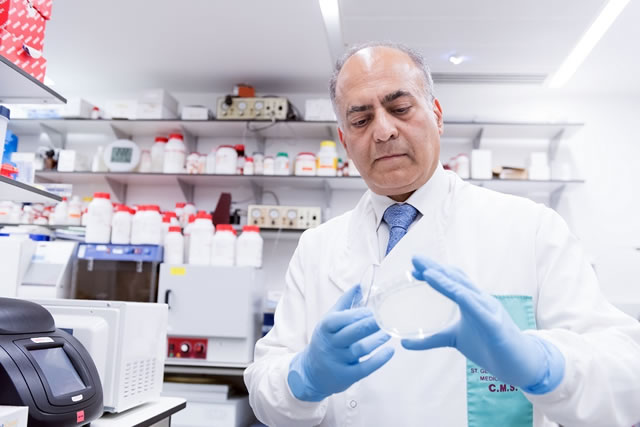St George's Vaccine Trial Opens To Over 55s
Project team very keen to recruit participants from the local area

Prof Sanjeev Krishna, Professor of Molecular Parasitology and Medicine, Infection and Immunity Research Institute St George's
The next phase of the coronavirus vaccine trial began at St George’s Hospital last weekend, as recruitment opens up to participants from older age groups, including those aged 56-69 and 70 and over.
The team is very keen to recruit participants from the local area.
This part of the study will assess the immune response to the vaccine in people of different ages, to find out if there is variation in how well the immune system responds in older people.
As with the previous phase of the study, half the participants will receive the new coronavirus vaccine, while the other half will receive a control vaccine designed to prevent meningococcal disease.
Eligible volunteers will be booked in for a screening visit where a blood test is taken to see if they have previously been exposed to the virus. Those that have not will then be eligible for vaccination.
The participants will then be followed up by clinicians at 1, 3, 6 and 12 months after vaccination, and will also be seen if they report any symptoms of possible Covid-19.
The trial is designed and organised by the University of Oxford and managed by researchers and clinicians at St George’s University and Hospital Trust as one of many sites across the country.
The team hopes to see a significant reduction of coronavirus cases in those receiving the new vaccine compared to the control vaccine.
Professor Paul Heath, who is helping to lead the trial at St George’s, said the next phase of the trial “will bring us closer to understanding both the safety of the vaccine and whether it is able to prevent coronavirus”.
However, he warned it will be “several months” before we have enough data to see if the vaccine works, depending on the transmission rate of the virus in the UK.
“We’re working as quickly and safely as possible in order to find out more and hopefully make a vaccine available,” he said.
This trial forms part of 13 studies being carried out on the site to tackle the coronavirus pandemic.
According to National Institute for Health Research (NIHR) data, St George’s, University of London and St George’s University Hospitals NHS Foundation Trust are leading the country for urgent public health studies into coronavirus, alongside Southampton General Hospital.
Other studies include testing different treatments as part of the national RECOVERY trial, developing rapid antibody tests for the disease and understanding whether pregnant mothers can pass coronavirus on to their babies in the womb.
Academics at St George’s also worked on new guidance issued in the British Medical Journal today (May 22), which recommends primary care workers should consider screening patients for loneliness, depression and anxiety to prevent and mitigate the mental health effects of social distancing.
They suggested remote consultations, and social prescribing of online exercise and dance classes could help those struggling.
Further details on how to volunteer for the trial can be found at: covid19vaccinetrial.co.uk/participate-trial. Prospective participants should select ‘London Sites’ and register to participate at St George’s University Hospital.
Sian Bayley - Local Democracy Reporter
May 27, 2020